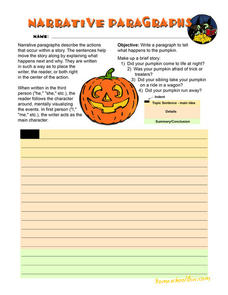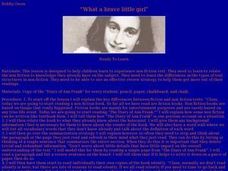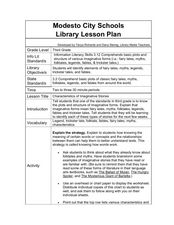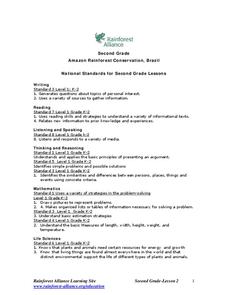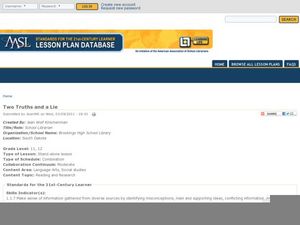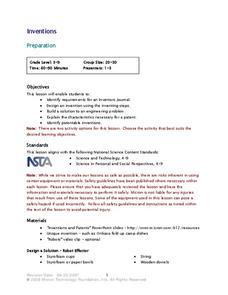Curated OER
Narrative Paragraphs
Young writers use the provided Halloween-themed template to record information gathered after researching a topic related to the October holiday. Six different expository text structures are suggested as a guide; however, information on...
Curated OER
What a Brave Little Girl
Learners practice relating non-fiction to knowledge they already have on the subject. They evaluate differences in the types of text structrures in non-fiction. They employ a review strategy that allows them to understand their reading.
Curated OER
Protists - The Protozoans
Five pages provide thorough coverage of three protozoans: euglena, amoebae, and paramecia. For each, junior biologists read factual text, label the organism, and write answers to several questions. This neatly organized assignment is...
Curated OER
Animals Galore
A well-designed lesson plan which covers the characteristics of the animals found in the six animal groups is here for your young biologists. In it, learners divide up into six groups; the amphibians, reptiles, mammals, birds, fish, and...
Curated OER
Night: Unsent Letters Writing Strategy
As part of their study of Elie Wiesel's Night, individuals assume the voice of an Auschwitz survivor and craft a letter to a former SS officer who worked at the camp and claims he is not guilty of any crime.
Curated OER
Characteristics of Imaginative Stories
Third graders explore genre characteristics. In this genre literacy lesson, 3rd graders listen to a variety of fiction stories and classify them according to genre. Students identify common features in each genre and complete a chart by...
Curated OER
Insects A-Z!
Alphabet insects! Who has ever heard of such a thing? Get ready because your class is going to research insects that start with a specific letter of the alphabet. In small groups, they'll use the Internet and reference texts to locate...
Curated OER
Figurative Language
What is figurative language, and why do we use it? Introduce your high schoolers to some examples and discuss the importance of including this element in your writing. After studying a text and searching for examples, writers will...
Curated OER
The Future
This teacher guide provides several ideas for how to structure a unit on the futur simple. Start by having your class read the short passage provided about Google. As they read, pupils should categorize verbs by type to highlight verbs...
K20 LEARN
Ace in the Hole
How does inertia affect an object's trajectory? After watching a video on safety belt use, pupils discuss the notions of inertia. Using their knowledge, individuals try to drop a ball on a target while running, and classmates observe the...
Curated OER
Forest Activity: Forest Layers
Students examine the forest layers and types of forests. They explore a website, read content on forest layers and the effects of environmental conditions, sumarize the characteristics of a forest type and present the information to the...
Curated OER
Amazon Rainforest Conservation, Brazil
Students explore the concept of understanding the effects of disturbances in an environment. In this life science lesson, students use the game Jenga to help capture the idea of environment disturbances. Students discuss the effects of...
Curated OER
The Structure of British Columbia's Government
Eleventh graders play a "card game" centered around a "Jeopardy" type of task designed to review pertinent information on the subject of the three branches of B.C.'s government.
Curated OER
What Structural Challenges Do Bridge Builders Face Today?
Young scholars investigate the process of constructing a bridge. They study the meaning of structural force and draw pictures of examples. Students identify the types of building materials have been used in history to construct bridges...
Curated OER
Two Truths and a Lie: Internet Research Skills
It's tough for high schoolers to assess what is a credible resource and what is not. A helpful resource prompts class members to research a particular topic and record two facts—and create one lie—while documenting the sources. They then...
Curated OER
Save a Reef!
Design a public information campaign to improve understanding of the coral reef crisis. Read about and discuss the biology and threats to the coral reef. The class creates a public information program about the problems facing the coral...
Curated OER
Transition Words in Expository Writing
Create to learn! Your class can create posters of transitional words and phrases to help them compose an explanatory text. They work in groups and focus on one type of transition (time, place, importance, etc.). They also create a poster...
Curated OER
Comparing Mitosis with Meiosis
Life science learners view an online animated mini textbook comparing two types of cell division. Working in groups, they use a digital microscope to capture images of cells in different stages of mitosis and meiosis. Then they create an...
Curated OER
Inventions
Students study invention steps and design their own invention. In this invention activity, students discuss inventions and the process of inventing. Studnets write in an inventor's journal and study various types of inventions. Students...
Virginia Department of Education
Synthesizing to Support a Thesis- Big Picture Emphasis
Help your researchers as they begin to develop a topic for research with these worksheets. Included are two nicely designed graphic organizers that assist learners in narrowing and researching their topic, and an efficient evaluation...
Curated OER
Those Cells Look Good Enough to Eat
Students explore the parts of the cell. In this cell lesson, students use foods to create cell models that represent the nucleus, cytoplasm, cell membrane, mitochondria, ribosomes, vacuoles, endoplasmic reticulum, and Golgi bodies...
Curated OER
Comparing Fiction and Nonfiction
Fifth graders compare and contrast an informational article with a fictional story. They read the story "The Contest" as a class, and discuss the different types of literature genres. Next, they complete a vocabulary worksheet and a...
EngageNY
Mid-Unit 3 Assessment, Part II: Organizing Notes for a Public Speech
It's all a matter of opinion! Pupils take Part II of the mid-unit assessment, in which they continue organizing their notes in preparation for writing an opinion speech. Using the resource, they add reasons, evidence, and a concluding...
Museum of Tolerance
Family Tree Activity
Discover the family histories that make the classroom with a family tree activity. Scholars locate information about their family, construct a family tree, and work together to tally where family members are born.


